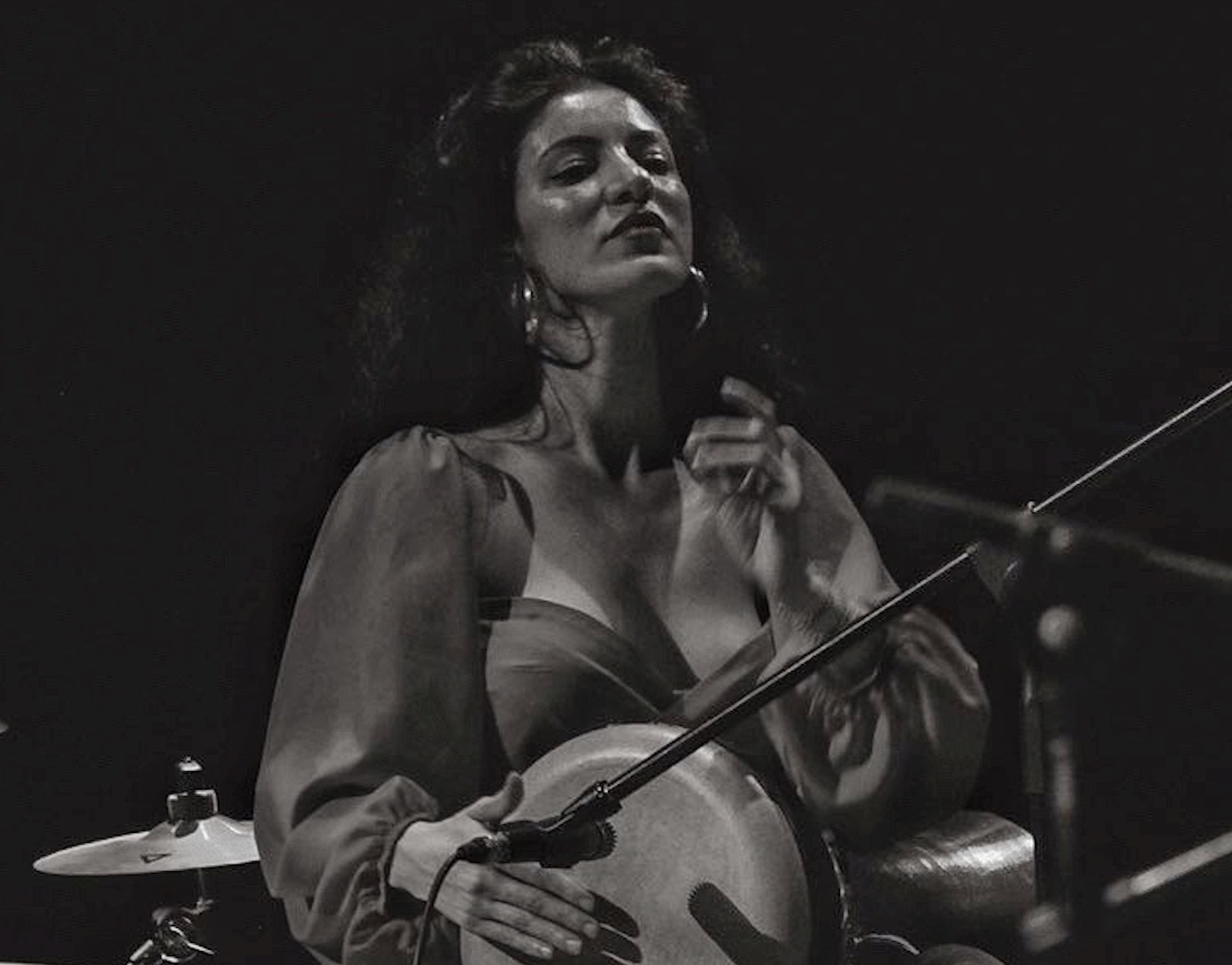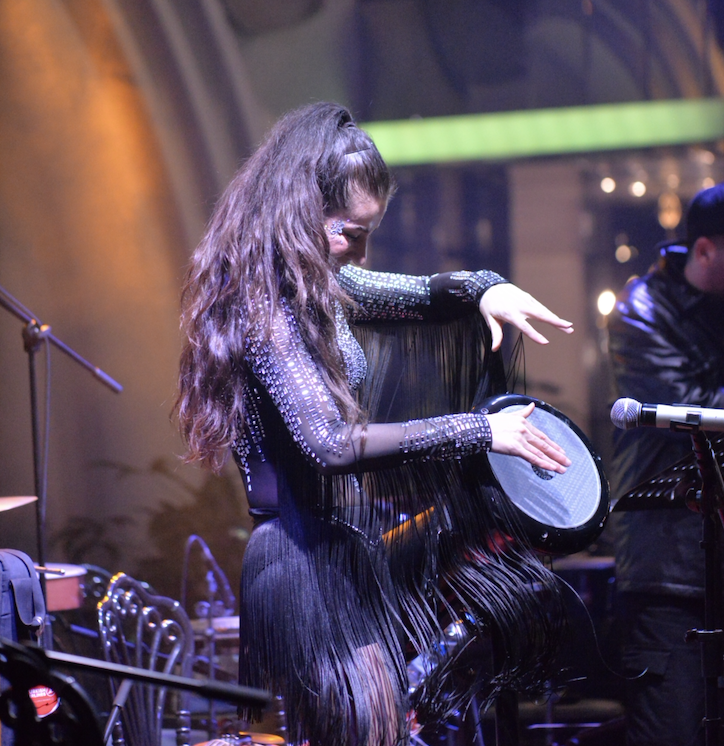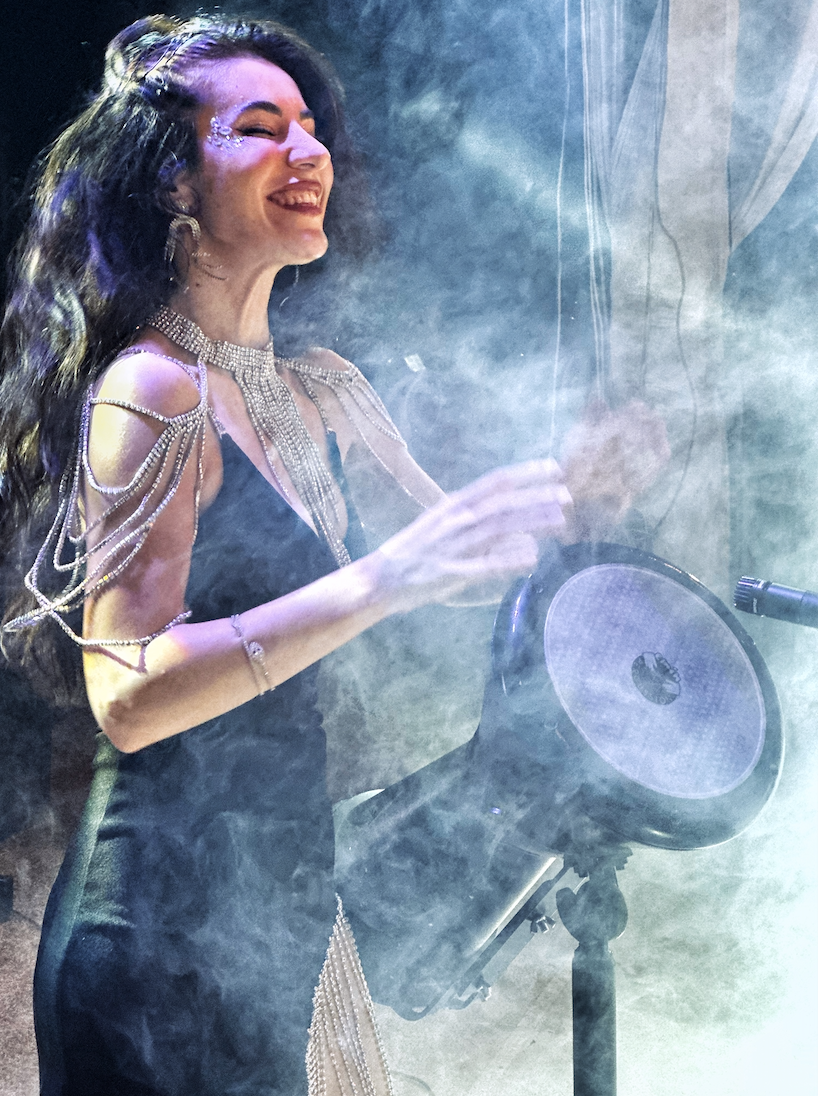“Engaging with percussion is a bold expression of my emotions. Striking the instrument with intensity may seem unconventional for women, but that’s precisely why I am drawn to it. My anger fuels my creativity, and I constantly seek new avenues to channel these feelings. Music became a vital outlet for me, and using percussion instruments to articulate my anger feels incredibly liberating.” These powerful reflections come from Dilan Yesilyaprak, a talented percussionist and educator who embraces the rhythm of her emotions through her art.
Born in the vibrant city of Diyarbakir, Yesilyaprak has family roots from the picturesque village of Ewina (Surgucu) in Mardin. In 1997, she and her family relocated to Izmir, where she spent her formative years. Yesilyaprak pursued her academic interests in sociology before immersing herself in Turkish music studies at a conservatory in Istanbul from 2011 to 2019. During her time there, she honed her skills under the tutelage of renowned percussionist Misirli Ahmet, dedicating six years to mastering the darbuka.
Her passion for rhythm took her to Egypt in 2015, where she underwent three months of intensive training in various darbuka techniques. To further refine her artistry, Yesilyaprak sought guidance from numerous masters across different percussion disciplines. Today, she proudly represents Gawharet El Fan, one of the globe’s premier darbuka manufacturers, which has launched a special series featuring her signature.

The timeless echo of the darbuka in Middle Eastern music
Percussion encompasses a vast family of instruments, with countless variations found across the globe. Each culture boasts its own distinctive percussion instruments, reflecting its unique heritage and traditions.
Yesilyaprak specializes in Middle Eastern percussion, a rich field that includes an array of traditional instruments. In addition to her expertise in this area, she has also explored Western percussion and drums, as well as Latin and Indian rhythms. Among the diverse array of Middle Eastern and Mesopotamian percussion instruments, Yesilyaprak primarily focuses on the darbuka, bendir (frame drum), hang drum, tef (tambourine), and def (erbane). To enhance her skills further, she actively engages in training with instruments from various cultures, striving to become a more versatile and accomplished percussionist.
The darbuka, a traditional percussion instrument, resonates through the annals of history, with its earliest manifestations appearing in Egypt. However, its rich presence is equally noted in the ancient records of Mesopotamia, the broader Middle East, and particularly within Kurdish musical traditions. As highlighted by Yesilyaprak, the darbuka has become a vital part of cultural expression across these regions.

Despite its historical significance, the realm of music has often seen a gender imbalance, with women frequently sidelined. Yesilyaprak recalls her own journey into percussion beginning in 2010, when there were only a handful of female percussionists in Turkey – namely Selda Ozturk and Diler Ozer – who made their mark as members of the Kardes Turkuler group. Their contributions were pivotal in challenging the male-dominated landscape of music and inspiring future generations.
“The underrepresentation of women in percussion stems from societal perceptions linking the act of striking instruments with power, authority, and masculinity. This association fosters a belief that women may lack the capability to express themselves through such forceful means. Engaging in percussion is often viewed as a bold choice, one that challenges traditional gender norms. The notion of hitting with vigor and adopting an assertive posture can feel incongruous for many women.
“However, this very challenge is what draws me to percussion. I am compelled to embrace the act of striking, not just as a form of musical expression, but as a statement against societal expectations. My desire to defy conventions fuels my passion; I thrive on doing what others suggest I shouldn’t. My anger becomes a catalyst for creativity, and music serves as an outlet for that emotion. Through percussion, I find comfort in channeling my feelings into rhythm and sound, making it a powerful medium for self-expression,” Yesilyaprak said.

A workshop born from solidarity
During the pandemic, Yesilyaprak established a vibrant workshop in the heart of Beyoglu, Istanbul, transforming it into a hub for artistic expression and women’s solidarity. This space not only offers training and performances, but also fosters a strong community among women. To date, Yesilyaprak has imparted her knowledge to thousands of aspiring artists. Remarkably, four or five of her initial students have blossomed into professional musicians and performance artists, now capable of captivating audiences of thousands of people. These talented individuals continue to collaborate with Yesilyaprak, enriching the workshop’s legacy by teaching alongside her and inspiring the next generation of performers.
“In the midst of the pandemic, I found myself teaching online lessons to women confined at home,” Yesilyaprak explained. “This was a particularly challenging time, as reports of domestic violence surged and many women felt trapped in an environment that stifled their spirit. Even the kitchen – once a rare sanctuary for many – became a space of confinement. My motivation for teaching stemmed not only from financial necessity, but also from a desire to provide these women with a breath of fresh air amid their struggles.
“As I engaged with my students, I discovered a profound joy in teaching that inspired me to create a dedicated music workshop. Prior attempts to find my place in other art workshops had been unsuccessful; I often felt sidelined because I didn’t have strong financial motivations. However, the vision of establishing a solidarity network among these women remained strong, even if it was initially met with resistance. The workshop soon became a beacon of support. For instance, when one participant confided about her impending divorce and the challenges of her marriage, a fellow member – a lawyer – stepped in to assist with her case. Similarly, another student, working as a real estate agent, helped find housing solutions for those in need. This collaborative spirit exemplifies the power of community and shared resources among women,” she said.

A vision for unity and expression
Yesilyaprak envisions the formation of a dynamic percussion performance group that will bring together Kurdish youth, fostering a vibrant community through music. She notes that her student demographic predominantly comprises women and white-collar professionals. “They are open to all colors and ideas, eager to collaborate and learn from one another. Most of them are Kurdish women.”
In her role as both an educator and performer, Yesilyaprak collaborates with notable Kurdish artists such as Mehmet Atli, Harun Elki, Gulbahar Kavcu, Berfin Aktay, and Kajin Dara. She passionately identifies as a performance artist who thrives in live settings, emphasizing the importance of direct engagement with audiences. Yesilyaprak dreams of launching a collaborative percussion project that not only showcases the talents of Kurdish youth, but also celebrates their cultural heritage through rhythmic expression.
“In a vibrant vision for the future, I aspire to create a dynamic percussion ensemble composed of Kurdish youth, featuring 30 to 50 talented individuals wielding an array of diverse rhythmic instruments. My ambition extends beyond local stages; I envision this group captivating audiences at international festivals, sharing our rich cultural narratives through the power of percussion. While major festivals are a key goal, I am particularly eager to showcase our artistry in the cities of Erbil and Sulaymaniyah, where our performances can resonate deeply within our community,” Yesilyaprak shared.
Mevlüt Oğuz is a journalist, poet, and activist working in the fields of civil society, culture, and the arts. He is a member of the International Federation of Journalists (IFJ), the Kurdish PEN affiliated to International PEN, and the Istanbul branch of the Human Rights Association (İHD).

